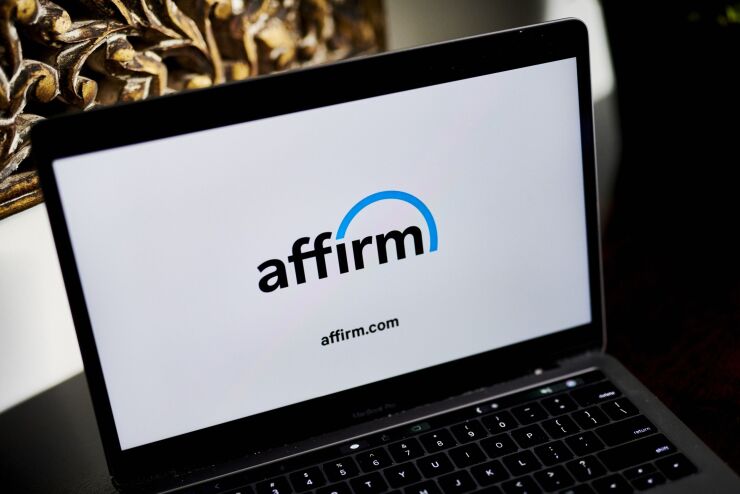
U.S. consumers juggle a growing array of payment options, and buy now/pay later fintechs are adding another choice to the mix — BNPL-branded cards to use in stores.
The San Francisco-based BNPL lender Affirm rolled out the
The moves come as the BNPL industry faces the growing likelihood of regulations that could rein in some of the freewheeling industry's practices, or at least require operators to report consumer borrowing activity to credit-reporting bureaus to address consumer lending risk.
Affirm said in a recent U.S. Securities and Exchange Commission
The timing for regulatory guidance in the booming BNPL arena is probably ripe, as more than one in four consumers are routinely using BNPL products to make purchases, according to new research from J.D. Power.
"Debit dominates the [point-of-sale] marketplace, and that's a trend that will probably continue, but it was somewhat surprising to see what a strong foothold BNPL checkout has gained in recent years," said Miles Tullo, J.D. Power's managing director of banking and payments.
Accounting for all purchases online, in stores and through mobile devices, 78% percent of U.S. consumers use debit cards, while 74% pay with cash, 66% use use credit cards, 36% use digital wallets and 33% pay with gift cards, J.D. Power found in a study fielded among 62,600 consumers between April and June.
Twenty-eight percent of consumers use BNPL services, while 20% use merchant apps, 19% pay with a check, 14% use prepaid cards, 7% pay directly from their bank account and 3% use cryptocurrency, based on J.D. Power's inaugural study of U.S. payment methods.
Affirm and Klarna both recently reported healthier financial results — a rebound after consumer credit quality declined and
It's unclear whether BNPL fintechs will succeed in building as much momentum through in-store sales as they did online, when the pandemic helped power an e-commerce surge. In addition, BNPL providers' physical cards have unique and somewhat complex features that straddle both the debit and credit card experience.
Affirm's CEO, Max Levchin, recently told analysts that he hopes the company's card will become the default payment device for users who link a bank account, enabling them to pay for in-store or online purchases in full or finance them through a range of options in combination with the Affirm app. The app monitors users' creditworthiness in real time.
Financing options available for Affirm Card users range from 0% four-part installment loans to 12-month financing with interest rates as high as 36%. Users have up to 24 hours after the purchase to decide whether they want to finance it instead of debiting the funds from a linked bank account. Affirm Card users can also request a payment plan within the app before making a purchase; the offer expires within two hours. Users may also adjust the timeline for repayment of a proposed loan within the app after making a purchase.
"I can imagine consumer confusion when presented with three finance options at the point of sale, especially when one has a high interest rate," said Ariana-Michele Moore, a retail banking and payments advisor at Datos Insights.
So far, users of the Affirm Card, issued by Evolve Bank & Trust, are conducting three times as many transactions as all other Affirm users, and more than 50% of Affirm Card transactions are interest-bearing, the company said when announcing earnings for the quarter ended June 30.
Affirm charges no late fees, and users provide only a few pieces of information to qualify for a loan. The company said it reports borrowing activity to Experian now and plans to
By contrast, the
Afterpay's virtual Visa card, usable in stores and at online merchants, offers 0% financing for loans up to $2,000 through a four-part installment plan and interest-bearing loans repayable in monthly installments with interest rates up to 36%; the card is provided through First Electronic Bank in Salt Lake City.
As
"BNPL loans cannot easily be integrated into today's credit risk modeling, because BNPL purchases could create a large number of inquiries, along with a shorter overall account [duration], but it's clear that lenders need to understand the full debt obligations of consumers," Moore said.
BNPL fintechs' in-store cards are seeking traction in a more challenging economic environment for cards, when consumer risk has increased amid inflation and rising interest rates have changed profitability models, said Rodman Reef, a managing principal with Reef Karson Consulting.
"It was one thing to offer zero-based loans when the cost of money was close to zero during the pandemic, but that's no longer the case. So we're seeing changes in BNPL products because companies like Affirm and Klarna realize money is no longer free," Reef said.






